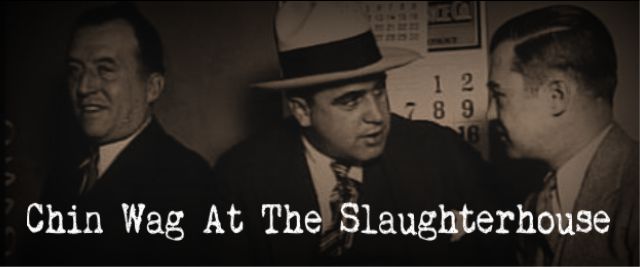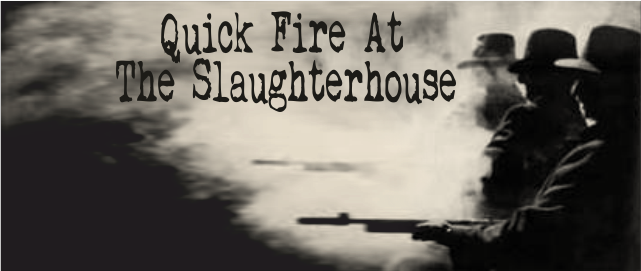
Ryan Bracha is a director and author. His novels include Strangers Are Just Friends You Haven’t Killed yet. His latest novel is The Switch, an exploration of identity and the parallels that inhabit fictions and the realities they represent. Ryan me at The Slaughterhouse where we talked about his new release and filmmaking.
 Tell us about your latest novel.
Tell us about your latest novel.
Five people inexplicably wake up as one other in a mass phenomenon known as The Switch. It happens to thousands of other people too, but given that one of them is a convicted serial killer and the other is a butter wouldn’t melt nation’s sweetheart, these five fall right into the public eye. Much sordid and violent actions follow. It’s Quantum Leap on a massive scale, with a seasoning of Cronenberg’s Crash, American Psycho, Lynch’s Lost Highway, Aranofsky’s Pi, Palahniuk’s Invisible Monsters, and lathered liberally with a satire of our news outlet’s obsession with taking their respective stories directly from what Twitter is saying. It’s an extreme book, but it has a point to make.
How important is the parallel between writer and film maker to you?
Not at all. Film making was a long, arduous and largely thankless process of bringing stories to life. You rely on dozens of other people to get your vision right, and more often than not they get it wrong. With my novels I love the overall control of where the story is going, how it’s brought to life, and the beauty of the written word over the moving image is that it’s far more open to all manner of interpretation. I wasn’t that good a film maker anyway. It was more about telling stories than anything else. Funnily enough though, I do intend to novelise my feature at some point.
What else is on the cards for you this year?
I’ve got a couple of things in the pipeline. Immediately next is my long-delayed Twelve Nights at Table Six project, which is the sequel to the Twelve Mad Men collaborative novel I released last year. One Richard Godwin features in both, and I’d hope he’d be an ever present in the continuing series. After that I’ve got the third book in my Dead Man Trilogy, and I’m also looking at putting out the second book in the Abrachadabra Books catalogue, which is Paul Brazill’s Neon Boneyard. That’s another delayed project which has kind of taken a back seat whilst I finished the Switched. I’m a bad person. Probably the worst person you know. I’m a real dick.
How important is sleaze you as a writer?
Sleaze is good. Very good. The underlying sexual threat of it intrigues me in general. I like it as a character trait in my antiheroes, as it gives me an opportunity to write some imaginative and obscene set pieces and dialogue. There are other forms of threat to utilise in fiction, of course there are, but personally I find sleazy threat much more interesting to write.
Who are your literary influences?
Before I started writing, I was big into Palahniuk, Elmore Leonard, Chris Brookmyre, the Coen Brothers, Tarantino. Those kinds of folk. I’d say they probably assisted in the creative process. Afterwards I picked up Irvine Welsh and Hubert Selby Jr and they opened my eyes to shoving two fingers up to convention and telling a story however you want, pushing the limits of taste, and I was hooked on that vibe. It was like they were writing just for me. I’m big into the indie lit scene right now, and there are a lot of kindred spirits. Mark Wilson and Craig Furchtenicht are probably closest to my way of storytelling.
What do you make of the e-book revolution?
Well, it’s been an absolute revelation really, hasn’t it? I know it hasn’t changed everybody’s minds about independent publishing, but it’s going some way to letting those of us who are serious about writing get our work out there. Of course, there’s always the age old and justified point about there being a lot of shit out there too, but if you can write, you package and edit it properly, and work hard enough then you can stand out and make a good name for yourself. So yea, I personally love this revolution, and I intend to ride the wave until the next revolution comes along. That said, I’m the same with my books as I am my music in that if I utterly love the band then I’m having it on vinyl. I’ll download everything I might want to give a try to, but the Palahniuks, and the Welshes of my life will always earn their way onto my bookshelf at home in hard back. As a reader, I prefer physical books, as a writer I’m thankful for electronic.
Tell us about your films.
In terms of that era of my life, I wrote and directed one feature film, directed a music promo, and then spent about a month in Paris writing my follow-up feature, which sadly couldn’t be made, due to an almighty fall out. I’ll try and tackle them in that order. Basically, coming out of university, a friend and I founded a not-for-profit film company, where we’d get funding for doing groups and sessions with teens to get them into film. On the side, we were making a film at zero cost, called Tales From Nowhere. At the time I was punting it as Kes meets Pulp Fiction. There were four interwoven stories set on a Rotherham council estate, loosely based on mine and my friend’s experiences living in rough as fuck areas of Barnsley and Rotherham, surrounded by territorial and feral Burberry clad fuckers. Not happy times. We spent every spare minute we had auditioning people, finding locations, trying to get everybody (who were working for free) in one place at the same time, and we spent about a year making it. We were able to get it on at the Showroom, which is Sheffield’s huge indie cinema. We were up against The Cat In The Hat (Mike Myers), and got a full house, smashing the animated fuck all over. It was a proud moment, seeing that twelve months of hard work come to fruition.
A guy I worked with had got his band signed, and the guy who was set to make their video let them down, so he called me and asked if I could do anything for them. They offered to pay, I asked for 8 beers. I should have asked for money. That was a very good time, I enjoyed that a lot.
The second feature, which was called Dirt merchants, was an ambitious undertaking to say the least. It was going to be an epic, spanning 30 years of two warring families living next door to one another. A council estate Romeo and Juliet. Unfortunately, my pal wanted to change the world and I was a hopeless piss head and stoner. We clashed and went our separate ways. He’s still trying to change the world. I’m telling stories on my own terms.
Graham Greene wrote, ‘There is a splinter of ice in the heart of a writer.’ What do you make of his observation?
I don’t think I’m smart enough to understand it. My interpretation of it is that we’re all cold hearted, is it that literal? I think it’s possibly true. You need to have some level of detachment to be able to do the awful things you do to your characters. The time and effort put into creating these people, only to put them through the wringer for entertainment purposes. It’s like kicking your child, I guess. I agree, then, if that’s the point of the quote. But I am a sociopath, my heart is a swinging brick.
Is there a particular event that has changed your life and influenced your writing?
My 20s. All of them. I found myself in all manner of scrapes through drink and drugs of one sort or another, and through my blatant disregard for the safety of myself or others. It opened my eyes. Turned me from a shy and naive fat student with an aversion to soap and water, to a regular moonlight flitter from houses and flats where I left unpaid bills and mess in my wake, to a sleazy and hyper confident shark looking for the next bed to hop into, to a 29 year old man, jaded and ready to settle down, less 9 teeth. A lot of the material in my books is inspired by those 3650 or so days. The books so far haven’t even scratched the surface of what happened in my 20s. I loved that decade. I’m older and wiser, and ready to come clean about it.
What advice would you give to yourself as a young man?
Don’t do anything different, make your decisions and mistakes, don’t get too down when you fuck it up, you’ll figure it out, kid.
Ryan thank you for an informative interview.
‘The Switched’ can be had at Amazon.co.uk or Amazon.com
Link to the music video: https://youtu.be/agSPONDL1AI
Website www.ryanbracha.webs.com
Facebook www.Facebook.com/ryanbrachaauthor
Twitter @ryanbracha
















